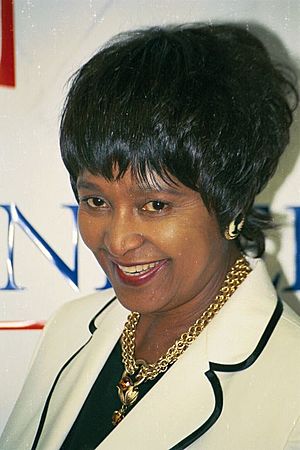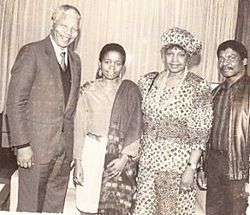Winnie Madikizela-Mandela facts for kids
Quick facts for kids
Winnie Madikizela-Mandela
OLS MP
|
|
|---|---|

Mandela in 1996
|
|
| Member of the National Assembly of South Africa | |
| In office 9 April 2009 – 2 April 2018 |
|
| In office April 1994 – 2003 |
|
| Constituency | Eastern Cape |
| Deputy Minister of Arts, Culture, Science and Technology | |
| In office 11 May 1994 – 31 August 1996 |
|
| President | Nelson Mandela |
| Minister | Ben Ngubane |
| Preceded by | Position established |
| Succeeded by |
|
| 2nd President of the African National Congress Women's League | |
| In office 1993–2003 |
|
| Preceded by | Gertrude Shope |
| Succeeded by | Nosiviwe Mapisa-Nqakula |
| Personal details | |
| Born |
Nomzamo Bob Zanyiwe Madikizela
26 September 1936 Mbizana, Cape Province, Union of South Africa |
| Died | 2 April 2018 (aged 81) Johannesburg, Gauteng, South Africa |
| Resting place | Fourways Memorial Park Cemetery |
| Political party | African National Congress |
| Spouse | |
| Children | |
| Residences | |
| Alma mater |
|
| Occupation |
|
Winnie Madikizela-Mandela (born Nomzamo Winifred Zanyiwe Madikizela; 26 September 1936 – 2 April 2018) was a South African activist and politician. She was known for fighting against apartheid, a system of unfair racial separation. She was also the second wife of Nelson Mandela.
Winnie Madikizela-Mandela served as a Member of Parliament from 1994 to 2003, and again from 2009 until her death. She was also a deputy minister of arts and culture from 1994 to 1996. As a member of the African National Congress (ANC) political party, she led its Women's League. Many of her supporters called her the "Mother of the Nation."
Born into a Xhosa family in Bizana, she trained as a social worker. She married Nelson Mandela in 1958. They had two children together. After Nelson Mandela was imprisoned in 1963, Winnie became a public voice for him. She spoke out against apartheid during the 27 years he was in jail. She became very important in the movement against apartheid in South Africa.
Winnie Madikizela-Mandela was often arrested by the apartheid government. She was also kept under house arrest and sent away to a rural town. She spent many months alone in prison. Nelson Mandela was released from prison in 1990. The couple separated in 1992 and divorced in 1996. Winnie Madikizela-Mandela continued to be an important figure in South African politics.
Contents
Early Life and Education
Winnie Madikizela-Mandela's Xhosa name was Nomzamo. She was born in the village of Mbhongweni, Bizana, in what is now the Eastern Cape province. She was the fifth of nine children. Her parents, Columbus and Gertrude, were both teachers.
Her mother, Gertrude, died when Winnie was nine years old. This led to her family splitting up, and the children went to live with different relatives. Winnie Madikizela-Mandela became the head girl at her high school in Bizana.
After school, she moved to Johannesburg to study social work. She earned a degree in social work in 1956. Years later, she also earned a bachelor's degree in international relations from the University of the Witwatersrand.
Her first job was as a social worker at Baragwanath Hospital in Soweto.
Marriage to Nelson Mandela
Winnie Madikizela met lawyer and anti-apartheid activist Nelson Mandela in 1957. She was 22 years old when they first met. They married in 1958.
They had two daughters: Zenani (born 1958) and Zindziswa (born 1960). Nelson Mandela was arrested and jailed in 1963. He was not released until 1990.
The couple separated in 1992 and divorced in 1996. Winnie Madikizela-Mandela continued to use the surname "Madikizela-Mandela."
Fighting Apartheid: 1963–1985
Winnie Mandela became a key leader against apartheid while her husband was in prison. Because of her political work, the government often arrested her. She was placed under house arrest, watched closely, imprisoned, and sent away to the town of Brandfort.
Her longest time in jail was 491 days. This began on 12 May 1969, at Pretoria Central Prison. She spent many months alone in a prison cell. She later said that her time in prison made her stronger.
From 1977 to 1985, she was forced to live in the town of Brandfort in the Orange Free State. During this time, she became well-known around the world. She helped set up a creche (a type of daycare) and a clinic in Brandfort. She actively campaigned for equal rights. The ANC promoted her as a symbol of their fight against apartheid.
South Africa's Change to Democracy: 1990–2003
When South Africa was changing to a multi-racial democracy, Winnie Madikizela-Mandela had a strong stance. She was seen with Nelson Mandela when he was released from prison in February 1990. This was the first time they had been seen together in public for almost 30 years.
She actively campaigned for the ANC in South Africa's first non-racial elections in 1994. In May 1994, she became the Deputy Minister of Arts, Culture, Science and Technology. She left this job 11 months later due to some problems.
She remained very popular among many ANC supporters. In 1993 and 1997, she was elected president of the ANC Women's League. In 1997, she appeared before the Truth and Reconciliation Commission. The chairman, Archbishop Desmond Tutu, recognized her important role in the anti-apartheid struggle. She admitted that "things went horribly wrong" at times.
In 2002, a Parliamentary ethics committee found that Madikizela-Mandela had not shared information about some donations and financial interests. She was sometimes absent from Parliament for months. In 2003, Parliament asked her to explain her absences.
Legal Challenges and Stepping Back from Politics: 2003–2007
In 2003, Winnie Madikizela-Mandela helped resolve a hostage situation at Wits University. A student had taken a staff member hostage because of unpaid fees.
Problems with Money
In 2003, Madikizela-Mandela faced charges related to money from loan applicants. She was found guilty of some charges. She was given a five-year prison sentence, but this was later changed to a suspended sentence. This meant she did not have to go to prison if she followed certain rules.
After this, she stepped down from her leadership roles in the ANC. This included her seat in Parliament and her role as president of the ANC Women's League.
Return to Politics
In December 2007, the ANC elected its National Executive Committee. Madikizela-Mandela received the most votes, showing her continued popularity.
She spoke out against the anti-immigrant violence that happened in May–June 2008. She blamed the government for not providing enough housing. She apologized to the victims and visited affected areas. She even offered her home as a safe place for an immigrant family.
For the 2009 general election, Madikizela-Mandela was placed high on the ANC's list of candidates. This showed that the party leaders saw her as important for gaining support from ordinary people and the poor.
Winnie Madikizela-Mandela was a political mentor to Julius Malema. He was later expelled from the ANC and started his own party.
2010 Interview
In 2010, Madikizela-Mandela was interviewed by Nadira Naipaul. In the interview, she made some strong comments about her ex-husband, Nelson Mandela. She said he had "let blacks down" and was only "wheeled out to collect money." She also criticized his decision to accept the Nobel Peace Prize with F. W. de Klerk.
The interview caused a lot of discussion. The ANC said they would ask her to explain her comments. On 14 March 2010, a statement was released on her behalf saying the interview was not accurate.
Death and Funeral
Winnie Madikizela-Mandela passed away at the Netcare Milpark Hospital in Johannesburg on 2 April 2018. She was 81 years old. She had diabetes and had been in and out of the hospital since the beginning of the year.
The South African government held a "Special Official Funeral" for her. Her public funeral service took place at Orlando Stadium on 14 April 2018. At the service, South African President Cyril Ramaphosa said that the ANC had not always supported Madikizela-Mandela during her difficult times.
Julius Malema gave a powerful speech, criticizing those who had distanced themselves from her. Winnie Madikizela-Mandela's daughter, Zenani, also spoke. She criticized those who had "vilified" (spoken badly about) her mother, calling them hypocrites. After the public service, her body was buried at a cemetery in Fourways, Johannesburg.
Honours and Awards
- In 1985, Mandela won the Robert F. Kennedy Human Rights Award. She shared it with other activists, Allan Boesak and Beyers Naudé.
- In 1988, she received a Candace Award for Distinguished Service.
- In January 2018, Makerere University in Kampala, Uganda, decided to give her an honorary Doctor of Laws (LLD) degree. This was to recognize her fight against apartheid.
- In 2021, the Mbizana Local Municipality in the Eastern Cape was officially renamed the Winnie Madikizela-Mandela Local Municipality.
- The town of Brandfort in the Free State was also officially renamed as Winnie Mandela.
- In 2022, a section of the R562 Road was renamed from Olifantsfontein Road to Winnie Madikizela-Mandela Road.
See also
 In Spanish: Winnie Mandela para niños
In Spanish: Winnie Mandela para niños
- List of civil rights leaders
- List of people subject to banning orders under apartheid
- The Resurrection of Winnie Mandela, 2018 biography of Mandela by Sisonke Msimang
 | Leon Lynch |
 | Milton P. Webster |
 | Ferdinand Smith |




